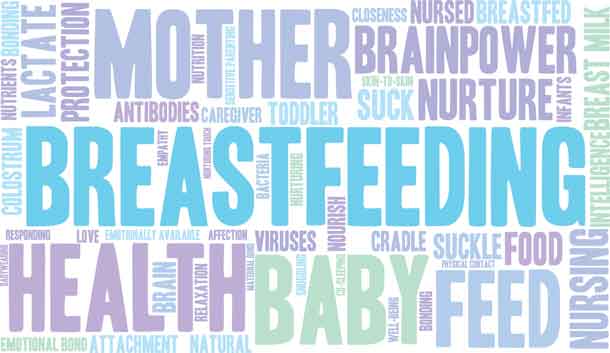
Breastfeeding Helps Reduce Infections in Babies
THUNDER BAY – Family – Promoting breastfeeding could lead to a substantial reduction in common infections and even deaths that are more common in Indigenous infants than non-Indigenous infants, according to a new study.
Indigenous infants in Canada experience gastrointestinal infection, lower respiratory infection (such as pneumonia) and ear infections “in excess frequency” and are “disproportionately affected” by sudden infant death syndrome, according to Dr. Kathryn McIsaac of the Centre for Research on Inner City Health of St. Michael’s Hospital.
The World Health Organization recommends infants be breastfed exclusively for six months and that breastfeeding continue, supplemented by foods, up to age 2 and beyond.
87.4 percent of all Canadian mothers breastfeed, Indigenous moms in Canada are less likely to do so
Breastfeeding is known to reduce a baby’s risk of acquiring infections, asthma or allergies, as breast milk contains antibodies that fight off viruses and bacteria. While 87.4 per cent of all Canadian mothers breastfeed, Indigenous moms in Canada are less likely to do so (77.8 per cent). However, some studies have shown that when Indigenous mothers do breastfeed they do so for longer than non-Indigenous women.
“Interventions that promote, protect and support breastfeeding may prevent a substantial proportion of infection and mortality in Indigenous infants,” says Dr. McIsaac, a post-doctoral fellow in epidemiology.
Dr. McIsaac said it was important that any program implemented to promote breastfeeding among Indigenous mothers be developed in consultation with Indigenous women and, where possible, delivered by Indigenous women.
“One approach may be to promote breastfeeding to the women themselves,” she said. “However, we recommend shifting the bulk of the responsibility for failure to breastfeed away from the woman and onto the health care system, where hospitals and community-based health programs should take the lead.”
Dr. McIsaac’s paper found that between 5.1 per cent and 10.6 per cent of ear infections, 24.3 per cent to 41.4 per cent of gastrointestinal infections, 13.8 per cent to 26.1 per cent of hospitalizations from lower respiratory tract infections (such as pneumonia), and 12.9 per cent to 24.6 per cent of sudden infant death could be prevented in Indigenous infants if they received breastfeeding.
- Inuit First Nations (off reserve) First Nations (on reserve) Metis
- Reduction in ear infections 6.5 per cent 5.1 per cent 10.6 per cent 6.1 per cent
- Reduction in gastrointestinal infections 29.2 per cent 24.3 per cent 41.4 per cent 27.9 per cent
- Reduction in hospitalizations for lower respiratory tract infections 17.1 per cent 13.8 per cent 26.1 per cent 16.2 per cent
- Reduction in SIDS 16 per cent 12.9 per cent 24.6 per cent 15.1 per cent
Dr. McIsaac noted that non-Indigenous Canadian infants would also benefit from higher rates of breastfeeding. While there would be proportionately fewer instances of ear infections (3.5 per cent), gastrointestinal infections (17.8 per cent), hospitalizations for lower respiratory tract infections (9.7 per cent) and SIDS (9.1 per cent), the absolute numbers would be higher because the non- Indigenous population in Canada is larger than the Indigenous population.
Dr. McIsaac’s data on breastfeeding prevalence came from the Canadian Community Health Survey and the First Nations Regional Health Survey. She also reviewed existing literature to determine the relative risk of not being breastfed on four separate health outcomes – SIDS, gastrointestinal infection, respiratory tract infection and ear infections.
Breastfeeding Support Programs
In Thunder Bay at the Thunder Bay Regional Health Sciences Centre there are resources for assisting mothers and mothers to be.
The lactation consultant at the Maternity Centre is available to assist pregnant women and women up to 8 weeks post-partum with education and assistance with breastfeeding. Women can arrange an appointment during pregnancy with the lactation consultant to become better prepared for breastfeeding, while postpartum women can receive assistance with concerns, or even support if breastfeeding is going well.
Some of the common reasons for referral to the lactation consultant include:
- Education about breastfeeding
- Difficulty with latch
- Sore nipples
- Not enough milk
- Oversupply
- Poor weight gain
- Wanting to know how to use equipment
- Questions about breastfeeding
- Mastitis
- Thrush
- Plugged ducts
- Breastfeeding support
Call the Maternity Centre today for an appointment with the lactation consultant, or to join one of the classes, 684-6228.
| Northwestern Ontario Information and Support for breastfeeding mothers. | ||
| These services are located in Kenora District | ||
 |
Deer Lake First Nation – Deer Lake Health Centre – Canada Prenatal Nutrition Program Deer Lake, ON P0V 1N0 Main 807-775-2226 807-775-9770 |
|
 |
Northwestern Health Unit – Kenora – City View Location – Child Health 210 First St N, Kenora, ON P9N 2K4 807-468-3147 |
|
 |
Red Lake Indian Friendship Centre – Site 2 – Canada Prenatal and Nutrition Program Training & Conference Center, 114 Forestry Rd, Red Lake, ON P0V 2M0 807-727-3000 |
|
 |
Sioux Lookout Meno Ya Win Health Centre – Healthy Choices for Healthy Babies 1 Meno Ya Win Way, Sioux Lookout, ON P8T 1B4 807-737-3030 |
|
 |
Sunset Women’s Aboriginal Circle – Aboriginal Prenatal and Postnatal Support Program 26 Second Ave, Sioux Lookout, ON P8T 1A5 807-737-7922 |
|
 |
Wabauskang First Nation – Canada Prenatal Nutrition Program Band Office, 131 Main St, Wabauskang 21, Perrault Falls, ON P0V 1T0 807-529-3174 |
|
 |
Wauzhushk Onigum Nation – Wauzhushk Onigum Medical Building – Maternal Child Health Program Golf Course Rd, Kenora, ON P9N 3X8 807-548-6340 |
|
| These services are located outside of Kenora District, but provide service to Kenora District. | ||
 |
La Leche League Canada PO Box 307, Silton, SK S0G 4L0 306-992-2125 |
|
 |
Thunder Bay Regional Health Sciences Centre – Maternity Care 984 Oliver Rd, Suite 402, Thunder Bay, ON P7B 7C7 807-684-6228 |
|






